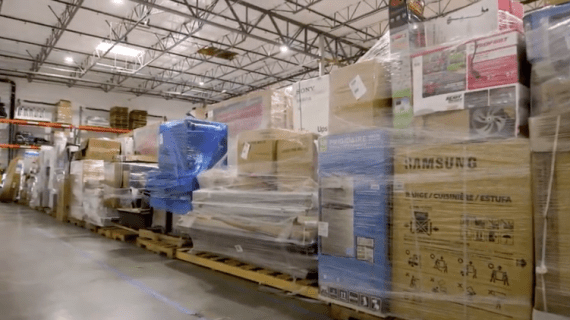Stagnant Sales Are Creating an Inventory Glut
[ad_1]
International retail volatility has been rampant over the previous 18 months. Throughout 2021 and the primary quarter of 2022 sturdy shopper demand was impeded by restricted stock attributable to provide chain issues. Then discretionary buying stalled as inflation took a toll on customers.
Now, as the provision chain points resolve, retailers are holding giant inventories with declining demand. Each retailers and logistics corporations are scrambling to find area to warehouse returned items, unsold out-of-season inventory, and new merchandise for the upcoming vacation season.

Lagging shopper demand has created a surge in extra stock. This warehouse is owned by Liquidity Providers, a liquidation firm. Click on picture to look at video.
Inflation
Monetary analysts proceed to argue whether or not we’re in a recession. U.S. inflation so far in 2022 has exceeded 8%, however the worth will increase primarily have an effect on important items resembling groceries and gasoline. Costs for non-essential objects have declined.
The Adobe Digital Worth Index relies on knowledge from Adobe Analytics and analyzes 1 trillion visits to international retail websites and over 100 million SKUs throughout 18 product classes. In July, in accordance with the Adobe DPI, international customers spent $73.7 billion on-line, $400 million lower than the prior month. 12 months-over-year ecommerce spending in July grew 20.9%, largely attributable to Prime Day sales. Retail ecommerce shopper spending reached $525.4 billion on-line so far in 2022 in accordance, once more, to Adobe. Nevertheless, July on-line spending decreased in comparison with Might’s $78.8 billion.
Customers are specializing in primary items. Furthermore, many are turning to buy-now, pay-later for groceries. Grocery chains Albertsons, Kroger, and Safeway have partnered with BNPL supplier Zip, permitting customers to make 4 prolonged funds for his or her purchases.
Therefore customers’ use of BNPL has moved past big-ticket purchases to recurring bills. Meals (together with restaurant orders) accounted for about 6% of the $45.9 billion in on-line BNPL prices in 2021, in accordance with knowledge analytics agency International Information. BNPL supplier Klarna studies that greater than half of the highest 100 objects its customers purchase is now grocery or home items.
Inventories
Matching provide and demand is more and more unpredictable. Owing to unstable provide chains, retailers have ordered merchandise additional prematurely to make sure availability. When customers in the reduction of on buying non-essential items, inventories ballooned.
Retailers need to add storage capability, each for vacation objects now reaching distribution facilities and to protect towards vacation stock-outs. But they’re additionally caught with out-of-season attire and high-ticket objects that buyers have stopped shopping for.
Brick-and-mortar retailers, direct-to-consumer retailers, and marketplaces should determine whether or not to deeply low cost the products or promote them to a liquidation enterprise, usually for pennies on the greenback. Liquidity Providers, a liquidation firm based in 1999, advantages from the surplus stock. It collects and resells surplus and returned items from retailers resembling Goal and Amazon.
Prologis, the worldwide warehouse chief by sq. footage, acknowledged in a current market evaluation that it anticipates a necessity for a further 800 million sq. ft of warehouse area past earlier projections to deal with extra inventories.
Attire gross sales have skilled a drastic reversal up to now three months. In accordance with Adobe Analytics, international attire costs have been down 1% year-over-year in July whereas falling 6.3% from June. It comes after 14 consecutive months of considerable worth will increase. Ecommerce costs for electronics — the biggest on-line class with an 18.6% share of spend in 2021 — fell sharply in July, declining 9.3% year-over-year in response to sluggish gross sales.
Main retailers — Mattress Tub and Past, Greatest Purchase, Nordstrom, Goal, Walmart — have talked about worth declines in earnings calls or 2022 monetary steering. Walmart acknowledged that it anticipated working income for the 12 months to fall by as a lot as 13% due to marked-down stock that isn’t promoting.
Peloton, the producer of high-priced tech-connected train bikes, suffered heavy losses this 12 months as individuals returned to public gyms and stopped shopping for luxurious train gear. Within the quarter ended June 30, 2022, the corporate misplaced $1.2 billion. Its inventory plummeted. In August Peloton introduced that it could promote its entry-level bike on Amazon, a departure from promoting direct to customers on-line and in its bodily shops. Peloton mentioned it could shut a lot of its U.S. shops subsequent 12 months.
Unpredictable
Briefly, unpredictability makes planning for the rest of the 12 months tough for each brick-and-mortar and on-line retailers. Moreover, the U.S. Federal Reserve’s intent to lift rates of interest may make customers hesitant to tackle vacation debt.
[ad_2]
Source link

